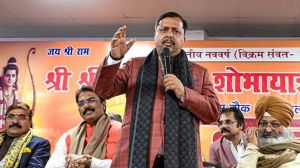Congress finds its anchor
As one associated with Congress drafting exercises for more years than I care to remember, the striking thing about the Congress session at ...

As one associated with Congress drafting exercises for more years than I care to remember, the striking thing about the Congress session at Talkatora last week was the stormless passage of the resolutions from drafting to adoption in comparison to the agonising which went into Pachhmarhi 1998 and even Bangalore 2001.
I attribute this to the two introspection exercises undertaken respectively by A. K. Antony8217;s political introspection group and Pranab Mukherjee8217;s economic introspection group. The ideological disruption of the Nineties is now over; the party has found both its anchor and its navigational chart.
The Congress 8212; along with the country and the world 8212; was thrown off-balance by the sudden convulsion of the Soviet Union in August 1991. The first impact of the earthquake in Moscow was on our economic policy. The second, linked to the first, was on our foreign policy. Over the Nineties, there was then a rightward drift in politics and political institutions. For us, as for everyone, it was a time of transition.
|
The secular agenda, obscured by the Congress8217; sins over Ayodhya, has been scoured and restored as the centrepiece of what makes Us different to Them |
A time of transition has the inestimable advantage of shaking up thought processes. On the other hand, the ship of state drifts from anchor. This has been particularly traumatic for the century-old Congress. And when the new orientations patently failed to carry the people in the successive parliamentary elections of 1996, 1998 and 1999, those not much enamoured of the new directions began questioning the abandoning of the tried and trusted ways. Thus was set up the thesis and anti-thesis that dramatically surfaced at Pachhmarhi. The comfortable cohesion of the first half-century of Independence had withered. A new cohesion of heart and head had to be put together.
Two ways were open to do this. One, imposition. Or, second, the tortuous processes of inner-party democracy. Perhaps because imposition was no longer possible, possibly because of an instinctive preference for internal discussion, the introspection groups gave a wide spectrum of conflicting opinion the opportunity to pit themselves one against the other, vent their spleen, make the bees in their bonnets buzz louder. This dialectical process has now reached the point of synthesis where the drafting of resolutions has returned to the routine of correcting grammar and syntax. On the four basics 8212; democracy, secularism, socialism and non-alignment 8212; the time of transition is over. Talkatora has consolidated the Congress.
On democracy, the adoption of the Congress Charter for Panchayati Raj is a little-remarked but profoundly significant milestone. All Congress-run states are going to be organising special sessions of their legislatures in this 10th anniversary year of the passage of the Constitutional amendments to review the actual progress in building elected local bodies into effective and viable institutions of local self-government. The Charter sets out in considerable technical detail the parameters within which this exercise is to be conducted. Sonia Gandhi has also proposed a special session of Parliament to this end; perhaps the 22nd and 23rd December, the precise days on which the Lok and Rajya Sabhas passed the 73rd and 74th amendments in 1992, would be the poignantly appropriate dates to see how far we have actually gone in making the largest democracy in the world also the most representative.
On secularism, Narendra Modi is to be thanked for concentrating the Congress mind wonderfully. For Modi8217;s stewardship of Godse8217;s Gujarat has compelled the Congress to face up starkly to the imperative need of becoming the spokesparty of an uncompromising secularism. The BJP8217;s idle hope that the alarums and excursions it has engendered on the borders would bury the genocide in Gujarat have been belied. The secular agenda, obscured by the central Congress Government8217;s sins over Ayodhya in December 1992, has been scoured and restored as the centerpiece of what makes Us different to Them.
In no sphere was the party more at odds with itself than on economic policy. On the one hand, the reforms of 1991-96 were winning the country plaudits from Washington to Tokyo via the CII and FICCI. On the other hand, if economic policy was indeed such a thundering success, why were we so ignominiously defeated in three parliamentary elections in a row? Why at the grassroots did the same slogan 8212; garibi hatao 8212; which invited such derision in the pink papers evoke so much applause at any street-corner meeting in any village or basti of the country?
The basic orientation of the party as the voice of the poor changed when the idiom changed to what was music in Davos but minatory in Mayiladuturai. It was not the specifics of the reforms process so much as its projection as prayaschit for the failures of the past that jarred within the party. Did the reforms of 1991 mean the Opposition were right when they said Nehruvian socialism had been a disaster? 8216;Delicensing8217;, 8216;financial sector reforms8217;, 8216;trade liberalisation8217; are not everyday words in the vocabulary of the hundreds of millions of the poor who are the Congress vote-bank, indeed the vote-bank of any political party in a country as poor as ours. If Talkatora signals the end of the inner-party debate over the basics of economic policy, and a resolution on economic policy can be moved by Manmohan Singh and seconded by an unreconstructed Nehruvian socialist like me, it is because the Congress, after a decade of ideological confusion, has now found its true voice. It has articulated an economic policy for a democratic polity.
The foreign policy resolution is anodyne. But Natwar Singh more than made up for that. It was his session; he was the star of the show. In a speech which showed the Congress still has a fire in its belly and that Natwar has made the transition from the Foreign Service to politics, he rubbished the marbles-in-the mouth deviations of Jaswant Singh and led the party back to a self-confident assertion of the fundamentals of non-alignment. The Congress has been restored as a party which, when lightning is falling from the skies, can still say, 8220;As the party of Gandhiji and Panditji, our preferred path is the path of peace and the peaceful settlement of disputes8221;.
- 01
- 02
- 03
- 04
- 05































